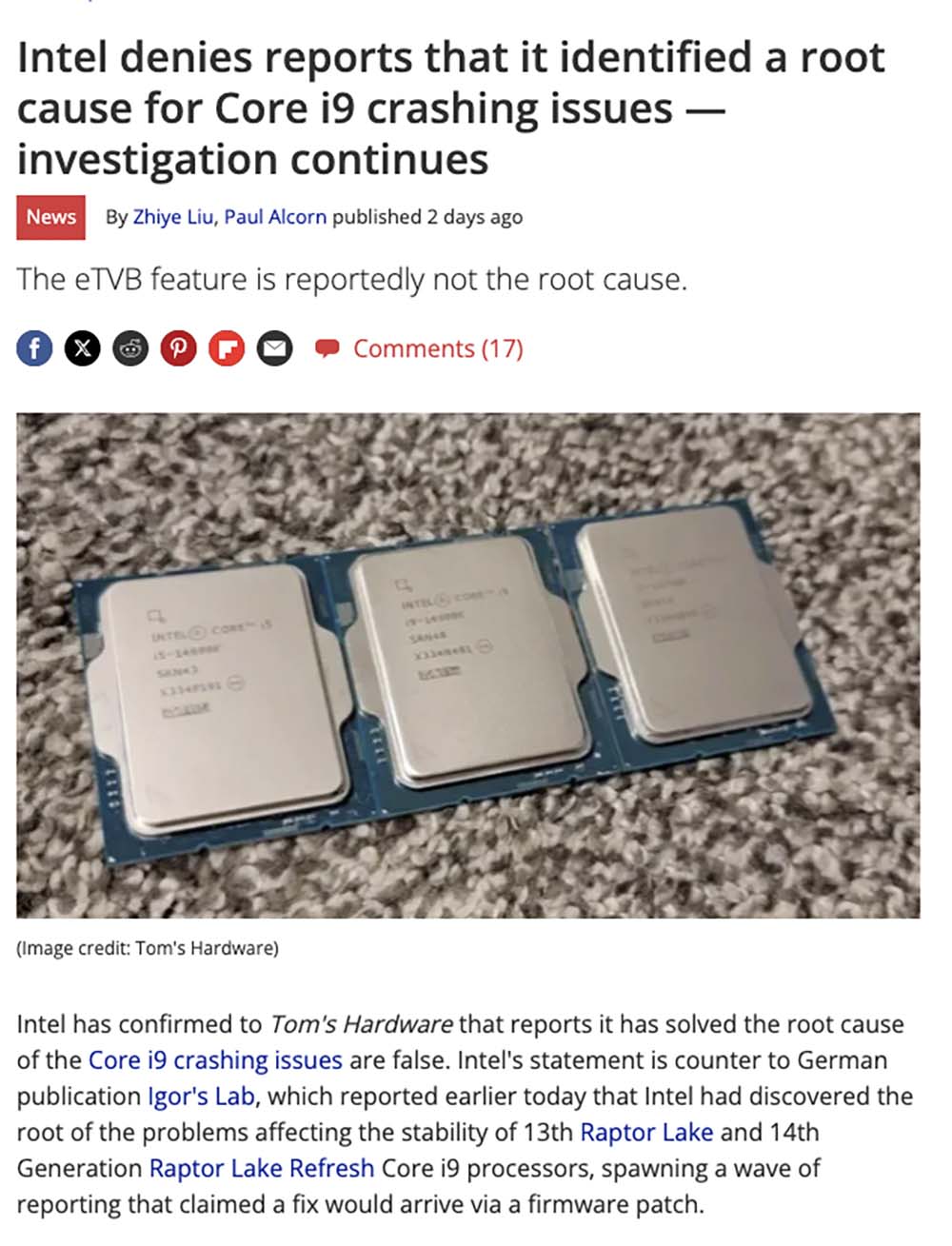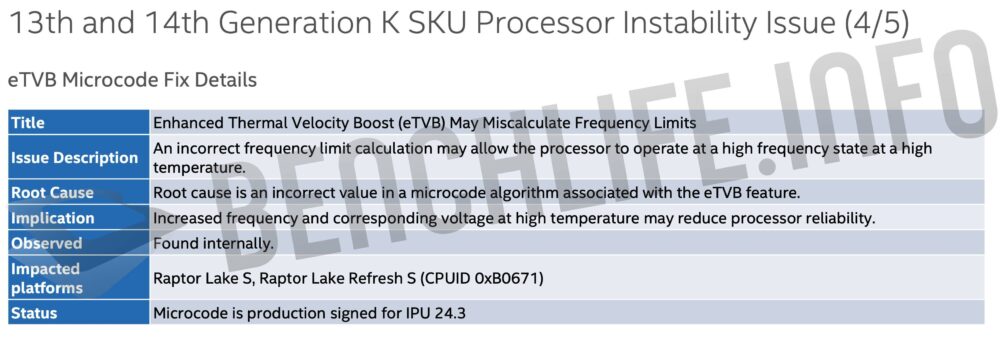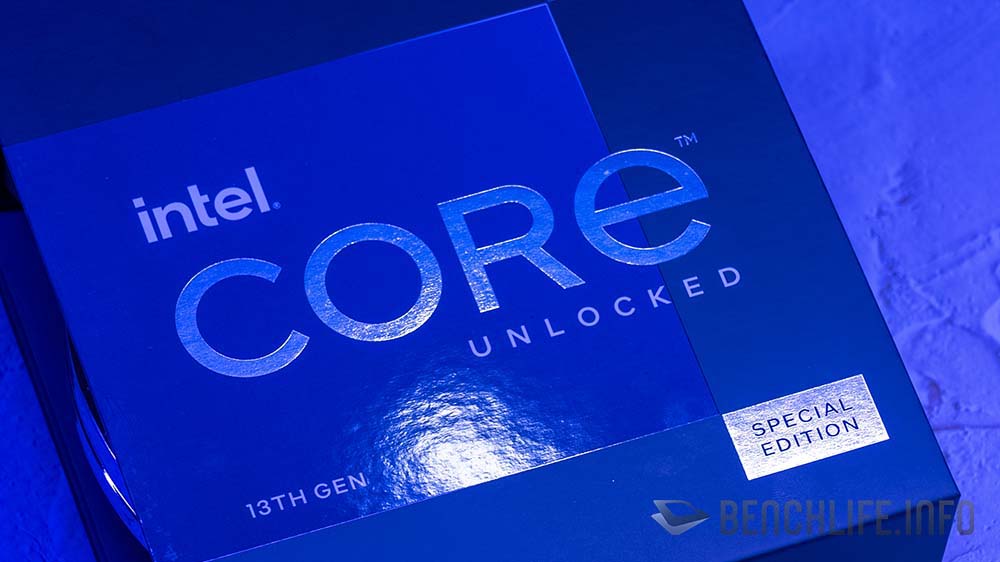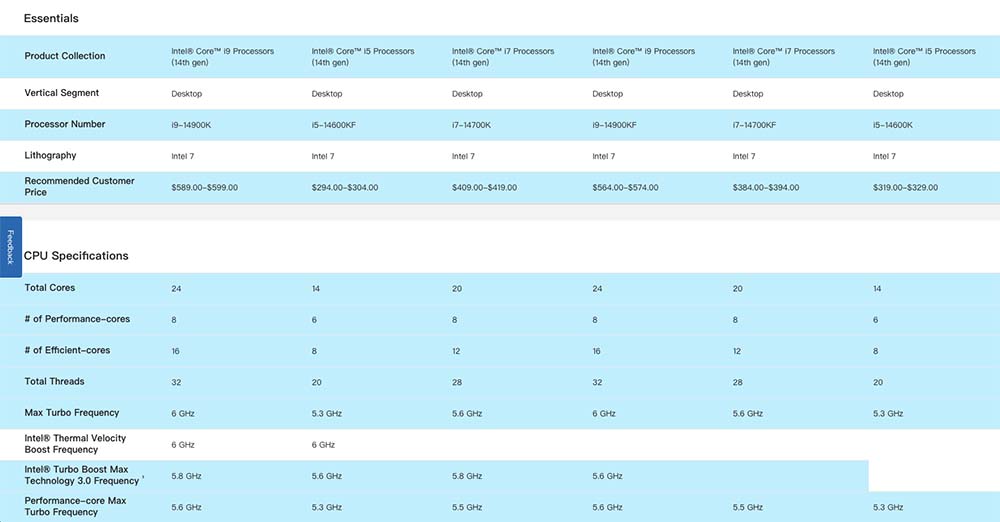可能可以解決問題,但也有可能還有其他問題產生,所以別太期待就是了。
經歷了 Baseline 或者是 Default BIOS 之後,Intel 針對 Raptor Lake-S 以及 Raptor Lake-S Refresh 的 13th 與 14th Gen K 系列處理器又有新的指令。
在我們接收到正式文件之前,其實德國的 Igor’s Lab 以及 Tom’s Hardware 都有針對相關內容進行報導,但最終確認 Igor’s Lab 的報導正確,只是不確定為何 Intel 會對 Tom’s Hardware 提出沒有相關內容內容來打臉其他媒體。
Intel has confirmed to Tom’s Hardware that reports it has solved the root cause of the Core i9 crashing issues are false.

最新文件中提到,Intel 強烈建議(strongly recommends)主機板廠提供包含 0x125 版本 microcode 的 BIOS 更新,以確認 eTVB 能符合 Intel 規範;所謂的 eTVB 是指 Enhanced Thermal Velocity Boost,而此次的 eTVB microcode 更新主要是「避免」錯誤計算時脈限制的可能。

Title – Enhanced Thermal Velocity Boost (eTVB) May Miscalculate Frequency Limits
Issue Description – An incorrect frequency limit calculation may allow the processor to operate at a high frequency state
Root Cause – Root cause is an incorrect value in a microcode algorithm associated with the eTVB feature
受到影響的平台就如前面提到,為 13th Gen 的 Raptor Lake-S 與 14th Gen 的 Raptor Lake-S Refresh 中的 K 系列處理器,這裡面涵蓋 Intel Core i5、Core i7 以及旗艦級的 Core i9 處理器,受影響的 CPUID 為「0xB0671」。

Intel 計畫主機板廠需要在 2024 年 7 月 19 日前完成含 eVTB microcode 的 BIOS 更新。
不過… Intel Thermal Velocity Boost,也就是 TVB 只有在 Intel Core i9-14900K 與 Core i9-14900KF 上才有導入,K 系列的 Core i7 與 Core i5 則沒有 Thermal Velocity Boost,那… Intel 這份 eTVB 的文件是…

雖然 Intel 認為 eTVB microcode 更新將有助於降低消費者在 13th 與 14th Gen K 系列處理器碰到 BSOD 的問題,但文件中仍強調 Intel 正在積極調查此問題,以確認是否有其他因素影響到此問題。
Intel is continuing to actively investigate this issue to determine any additional factors affecting this issue
換句話來說,eTVB microcode 更新可能有望解決 BSOD 或是處理器無故死亡的可能性,然而 Intel 官方仍舊沒有辦法確定究竟是什麼原因造成 13th 與 14th Gen 中的 K 系列處理器出現大量負評,或者是說系統不穩定的麻煩事情。啊,回到最現實的問題,結果到現階段都看似是 Intel 自己的鍋,那為何當初要怪罪到主機板業者身上,反觀 NVIDIA 一直大讚台灣產業鏈,Intel 真的是…
It may solve the problem, but there could be other issues as well, so don’t get your hopes up.
After experiencing Baseline or Default BIOS, Intel has new instructions for the 13th and 14th Gen K series processors for Raptor Lake-S and Raptor Lake-S Refresh.
Before we received the official documentation, Germany’s Igor’s Lab and Tom’s Hardware had both reported on the related content. Ultimately, it was confirmed that Igor’s Lab’s report was correct. However, it is unclear why Intel would deny Tom’s Hardware’s content to discredit other media.
The latest document mentions that Intel strongly recommends that motherboard manufacturers provide a BIOS update containing the 0x125 version microcode to ensure eTVB meets Intel specifications. The so-called eTVB stands for Enhanced Thermal Velocity Boost, and this eTVB microcode update is mainly to “avoid” the possibility of miscalculating clock limits.
The affected platforms, as mentioned earlier, are the K series processors in the 13th Gen Raptor Lake-S and 14th Gen Raptor Lake-S Refresh, including the Intel Core i5, Core i7, and flagship Core i9 processors. The affected CPUID is “0xB0671”.
However… Intel Thermal Velocity Boost (TVB) is only implemented on the Intel Core i9-14900K and Core i9-14900KF, while the K series Core i7 and Core i5 do not have Thermal Velocity Boost. So… this eTVB document from Intel is…
Intel plans for motherboard manufacturers to complete the BIOS update with the eVTB microcode by July 19, 2024.
Although Intel believes that the eTVB microcode update will help reduce BSOD issues for consumers with the 13th and 14th Gen K series processors, the document still emphasizes that Intel is actively investigating the issue to determine if there are any other factors affecting it.
In other words, the eTVB microcode update may potentially solve the possibility of BSOD or unexpected processor failures. However, Intel still cannot determine the exact cause of the numerous negative reviews or the stability issues with the 13th and 14th Gen K series processors. Ah, back to the most realistic question: it seems that Intel itself is to blame at this stage, so why did they initially put the blame on motherboard manufacturers? In contrast, NVIDIA has always praised the Taiwanese supply chain. Intel really is…